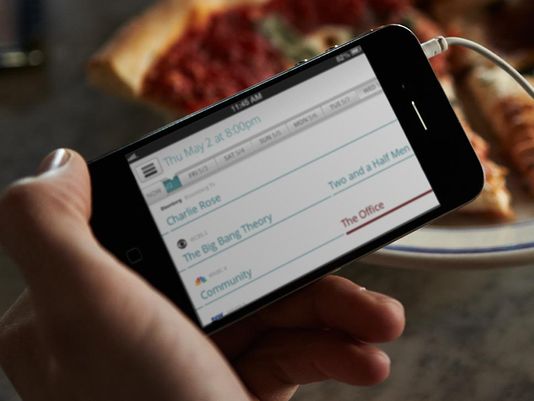Wolff: Concept of disruption under attack
HTTP/1.1 200 OK Server: nginx/1.2.7 Content-Type: text/html; charset=utf-8 Content-Language: en Last-Modified: Mon, 07 Jul 2014 03:55:05 GMT X-UA-Compatible: IE=Edge,chrome=1 X-Secret: cnpudnkgcnpiZXZnbUBoZm5nYnFubC5wYnogbmFxIFYganZ5eSBnZWwgZ2IgdHJnIGxiaCBuIHdiby4= Cache-Control: max-age=20 Expires: Mon, 07 Jul 2014 03:55:25 GMT Date: Mon, 07 Jul 2014 03:55:05 GMT Transfer-Encoding: chunked Connection: keep-alive Connection: Transfer-Encoding
The very concept of disruption, the most vaunted business idea of the day — young companies using technology to undermine the business basis of far more successful and established ones — is now under attack.
The intellectual revision began several weeks ago in The New Yorker with a piece by Harvard professor Jill Lepore, challenging the premise of the hugely influential 1997 book The Innovator's Dilemma, by another Harvard professor, Clayton Christensen, which articulated the overriding theory: Big companies could not merely abandon hugely profitable ways of doing business, hence leaving the door open to new companies able to prepare for the future because they were not bound to old ways.
But the practical counter-reformation may have happened two weeks ago in the Supreme Court with the 6-3 decision[1] to find Aereo, the broadcast television disrupter, guilty of copyright theft.
The Aereo proposition was a giddily disruptive one — a perfect blend of technology, hyperbolic logic and legal legerdemain — which offered consumers a way to get broadcast television without paying a cable company for it.
Once upon a time, broadcast television was available over the public airwaves via an antenna; but now, in order to get NBC, ABC, CBS and FOX and all local broadcast stations, most everyone pays a cable carrier. Consumers get clearer reception; broadcasters collect a fee from the cable operators. The crux of Aereo's disruptive idea was to provide every consumer an antenna the size of a pea at some remote location (while technically an actual antenna, in truth, more a metaphorical one) and then pipe the signal over the Internet. Aereo would thereby get paid for supplying its users with the network's content, without itself having to support the cost of that content.
With only the smallest critical interpretation, that's exactly what Google does: through a work-around-solution it profits from other people's content. (There is disruption that derives from introducing new technologies and there is disruption that is principally about evading or circumventing existing laws — and sometimes a little of both.) Google, through this wink-wink approach, has made billions and changed the world, so why not Aereo?
This must have been part of the Aereo attraction to investors and other law-abiding citizens who should have known better. That is, disruption happens — what can you do? Better to be on disruption's side, then its victim. The technology industry, among the most powerful industries in the country, perhaps the most powerful, has been built on such cleverness and now defends it with its money and its righteousness. Who among us, in this day and age, is gong to stand in the way of the future?
Clever ideas are the future.
Established ones are the past.
Choose your side.
Indeed, a corollary to disruptive theory, largely unmentioned in The Innovator's Dilemma or in the New Yorker article, is a certain level of acquiescence to disruption. Society stands by as it happens. Reasonable men fail to speak up.
For Uber to succeed[2], it must trammel a raft of labor laws, local regulations and insurance mandates. And it is succeeding. It succeeds because of a sudden mind-meld assumption, that all those laws, regulations and protections, created over many years by democratic government, are not as clever by half as new technologies. Likewise, Google has depended on awe as well as inertia in its redefinition of law and customs. What once would have been infringement, Google made a social good.
It's not just consumers who accept what is seemingly better-priced and more efficient, whole industries lie down.
But then disruption met the television business — a trade whose very essence is fighting, delaying and negotiating with forces (regulators, competitors, talent, new distributors, new technologies, advertisers, talent) that want to take its business. Television is the negotiating business.
And disruptive theory met Aereo, a company that pushed the idea of disruption to near martyrdom — you either accept the world as we define it, or we die (Aereo has suspended its business[3] since the court's decision).
Disruption has depended on a certain liberal anti-establishment viewpoint: New ways are better than old ways. But in the court's decision, liberals and moderates joined to defeat disruption; the conservatives sided with Aereo.
The technology world remains rather united[4] in its support for Aereo. Indeed, it seems sputtering in its disbelief that the court would not have recognized Aereo's disruptive virtue (the court clearly made up of old people who don't understand technology). In a sense, the technology world increasingly defines itself by what it sees as a libertarian view, that is, an anti-liberal, pro-business or pro-technology-business view. The disruptive technologists are becoming, in Chamber of Commerce fashion, defenders of their own turf and world view.
In the United States and in Europe, more and more antitrust regulators are seeing the disrupters as monopolizers. Lawmakers are seeing privacy issues as a new and potentially popular legislative front. Local officials are trying to claw back authority. And the television industry, which in many ways continues to hold the key to big audiences, premium advertising rates and hence digital profitability is a far more savvy, and brutal bunch, then the music and print people who failed to see what was coming.
The disrupters are being disrupted.
Disruption depends in part on the disrupters being able to get away with it. Aereo, finally and correctively, defines a theft too brazen.

Michael Wolff(Photo: Todd Plitt, USA TODAY)
Read or Share this story: http://usat.ly/1m6WiRp
References
- ^ http://www.usatoday.com/videos/news/2014/06/25/11368827/ (rssfeeds.usatoday.com)
- ^ http://www.usatoday.com/story/money/columnist/wolff/2014/06/14/the-rise-of-uber/10417655/ (rssfeeds.usatoday.com)
- ^ http://www.usatoday.com/story/tech/personal/2014/06/28/aereo-ceo-shuts-down-service/11619083/ (rssfeeds.usatoday.com)
- ^ http://www.usatoday.com/story/money/business/2014/06/25/aereo-ruling-qa/11352989/ (rssfeeds.usatoday.com)










